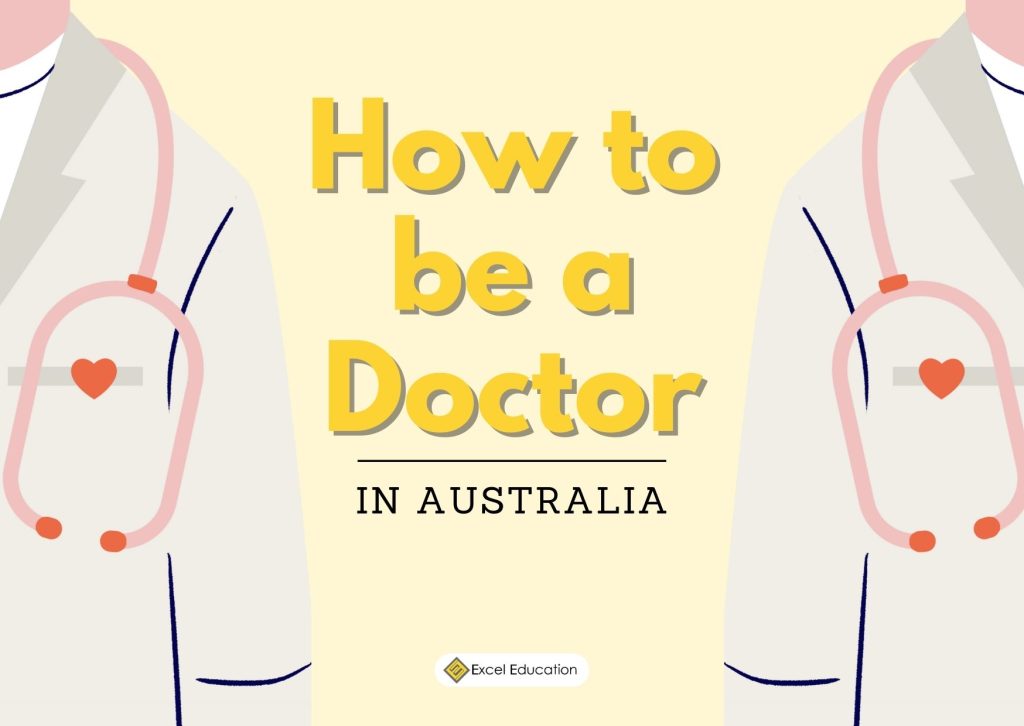
What is a Doctor?
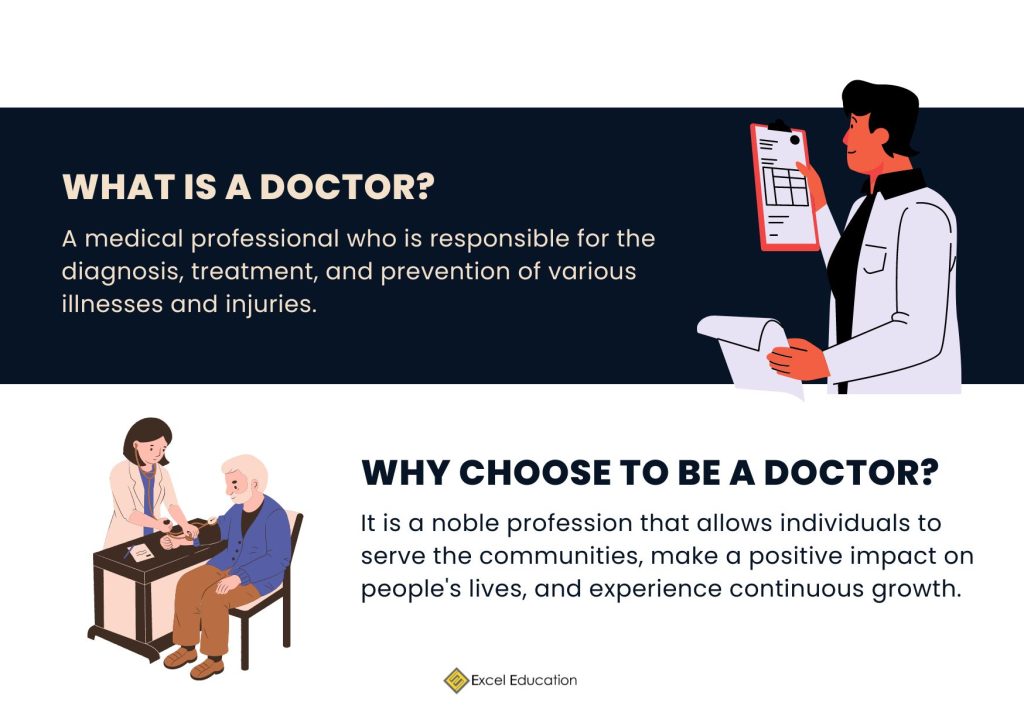
What is your first impression when we talk about superheroes? Often, many of us will think of capes and masks or even associate them with superpowers like super strength and enhanced senses like our friendly neighbourhood Spiderman or maybe Doctor Strange with powerful magical skills.
But in the real world, we clearly know that all of these are fictional. If we were to look for superheroes in our daily lives, yes, there’s one – Doctors. Doctors don’t wear capes or masks, but they are the unsung heroes of our society, dedicating their lives to the health and wellbeing of others.
By definition, a doctor is a medical professional who is responsible for the diagnosis, treatment, and prevention of various illnesses and injuries. They are trained individuals who possess a deep understanding of the human body and its functions. They tend to work day and night to ensure that their patients receive the best care and treatment.
Becoming a doctor is not only a notable career choice, but it is also a calling that requires a lot of things like passion, commitment, and an unwavering desire to help others live a better life through a healthy lifestyle.
In this article, we will explore how to become a doctor in Australia and what it takes to pursue this rewarding career journey. So, keep reading to discover the steps and requirements to embark on this fulfilling journey.
Types of Doctor
With the vast career opportunities in the medical field, here are the top 10 most popular careers upon graduating:
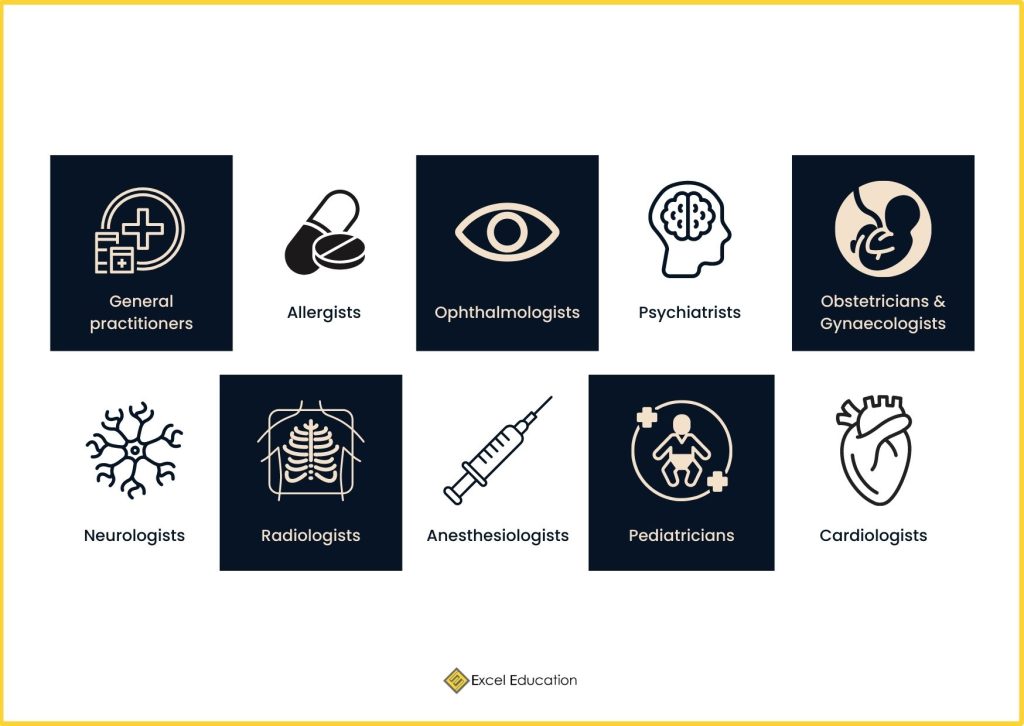
Types of Doctor | Specialisation |
General practitioners | One of the most common and well-known of all the different types of doctors. General practitioners can be easily located in a neighbourhood setting, particularly in a clinic where they focus on diagnosing and treating simple diseases or injuries |
Allergists | Also known as immunologists. This type of doctor focuses on preventing and treating allergic diseases and conditions such as asthma and skin diseases. |
Ophthalmologists | Specialise in the diagnosis and treatment of eye diseases and disorders. Ophthalmologists also work with patients with complex eye conditions and may also help patients for routine eye care. |
Psychiatrists | Skilled in diagnosing and treating mental, emotional, and behavioural health issues such as post-traumatic stress disorder (PTSD), depression, etc |
Obstetricians and Gynaecologists | Specialised in medical care for the female reproductive system and also offer treatment and care connected to pregnancy, childbirth, and fertility |
Neurologists | Have strong knowledge of the human nervous system and am skilled in providing treatment for disorders that affect the neuro system such as Parkinson’s disease, Alzheimer’s disease, and many more |
Radiologists | Specialise in diagnosing and treating sickness using medical imaging techniques such as X-rays, CT scans, MRI scans, ultrasound, and nuclear medicine |
Anesthesiologists | Commonly found in a surgical setting, they administer anaesthesia and sedation for medical procedures |
Pediatricians | Focus on primary care that works closely with children, adolescents, and babies, which bear the responsibility to diagnose, treat, and prevent any child-related illnesses and injuries |
Cardiologists | Specialise in diagnosing and treating diseases and disorders related to the cardiovascular system, which includes finding the causes and symptoms of heart diseases and providing the necessary treatment for it |
For more information on the details provided above, do not hesitate to contact us now!
Skills needed to be a Doctor
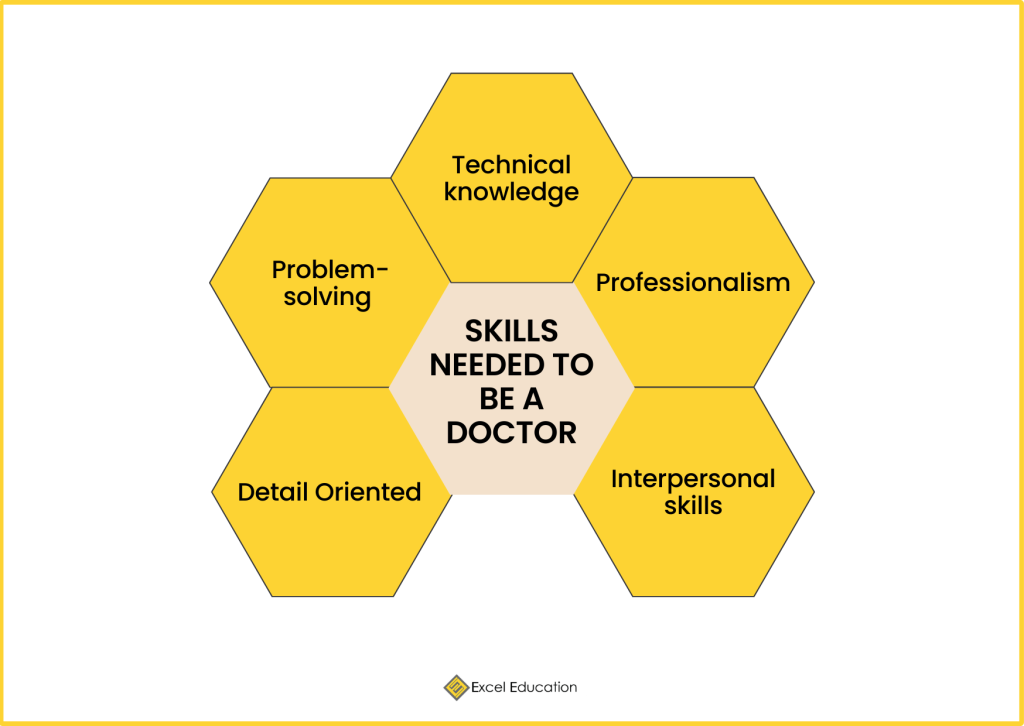
1. Technical knowledge
As doctors’ goal is to provide medical and care solutions, they must have a strong fundamental understanding of technical knowledge in medical sciences. Doctors need to have a deep understanding of their area of expertise as well as some general medical knowledge, so they can apply this knowledge in their work and provide the best treatment for their patients.
2. Problem-solving
To diagnose a medical condition accurately and recommend the best possible treatment and care, doctors must use their problem-solving skills effectively, by thinking critically, analysing the available information and resources, and making sound decisions to alleviate the patient’s suffering.
3. Professionalism
Maintaining professionalism is an important aspect of a doctor’s job. They must adhere to high ethical standards, respect privacy, maintain confidentiality, and uphold professional codes of conduct. In short, maintaining decorum and demeanour in all ways.
4. Detail Oriented
Medical treatment often comes with precise procedures and dosage calculations. Even minor mistakes in these areas can have huge impacts, so doctors must be meticulous and extra careful to ensure patient health and wellbeing are taken care of at all times.
5. Interpersonal skills
Doctors have to work closely with patients, their families, and other medical professionals. Interpersonal skills such as empathy, effective communication, and the ability to build rapport are all critical aspects of the process of providing care. There’s a time when doctors need to manage the negative emotions of either party and provide viable solutions to their causes.
Are you eligible to be a Doctor?
Following are the general entry requirements to study Medicine:
Academic Entry | Minimum Score |
STPM | CGPA 3.33 |
Matriculation | CGPA 3.33 |
A-Levels | 17 |
UEC | Aggregate score of 61 |
IB Diploma | 38 |
Australian Matriculation (ATAR) | 96 |
Note: Universities may have different requirements. To learn more, get in touch with us!
Entry Level | Minimum Score |
IELTS | Band 6.5 |
TOEFL | 90 |
Pearson Test of English | 65 |
Note: Universities may have different English Language requirements. To learn more, get in touch with us!
General Pathway to be a Doctor in Australia
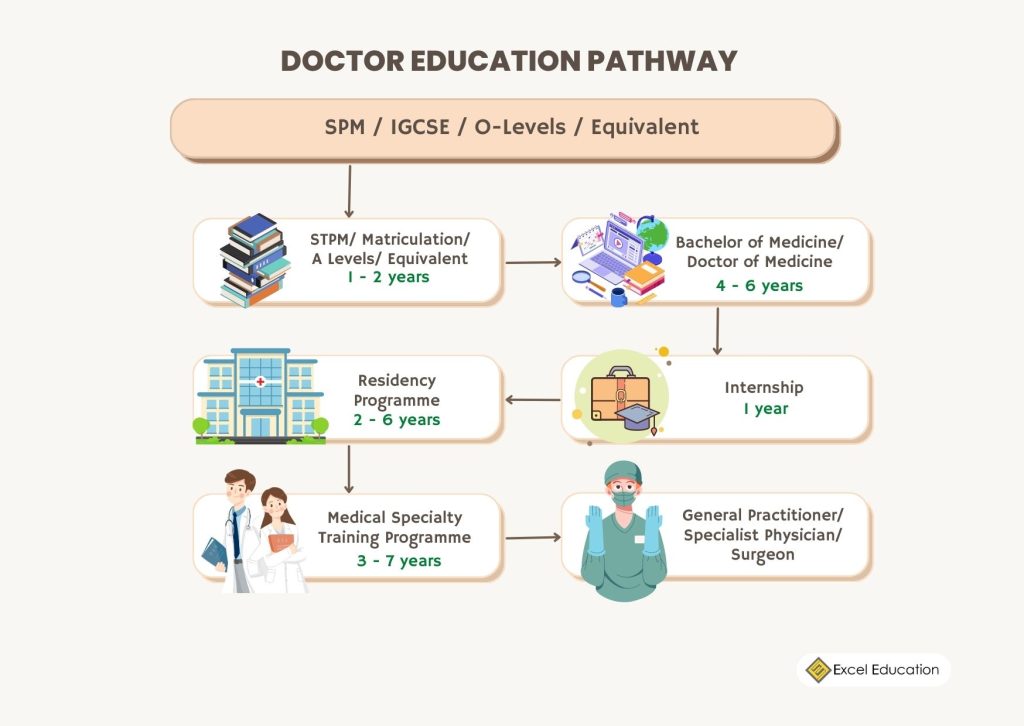
For a Malaysian to explore their career as a Doctor in Australia, below are the few steps that you need to follow in order to perform the Doctor’s duties in Australia.
Step 1: Complete a Bachelor degree programme that is related to Medicine. It is crucial for you to select the right course as it may affect your eligibility to further your study in medicine. Choosing high-level mathematics, chemistry, physics, biology, and English will put you in good stead to study Medicine.
Step 2: Take the necessary test for you to move forward with your plan. Tests such as the Graduate Medical School Admissions Test (GAMSAT), University Clinical Aptitude Test (UCAT), or Medical College Admission Test (MCAT), which are the common tests used for medicine. Remember to check each requirement for different university entry requirements.
Step 3: After completing the necessary test, you need to complete a medical degree, which usually takes 4 to 6 years to do so. Thereafter, complete 1 year of internship in a hospital or medical setting.
Step 4: Upon completion, you will be awarded with a general medical registration through the Medical Board of Australia. The registration will renew on 30 September each year so be sure to renew it to maintain your licence to practise medicine in Australia.
Step 5: After finishing the needed training as an intern in a medical setting, you can continue on by pursuing add-on training as Resident Medical Officer (RMO) to pave your way as a specialist in the future. The time needed varies depending on the specialisation.
Step 6: Once you have gained a sufficient amount of practise as an intern or RMO, you can choose to obtain a fellowship through specialty medical training programmes and the requirements to complete the programme differ from your chosen specialisation. Talk to us to find out more!
Do take note that the above is just a general guideline of how you can achieve your dream as a Doctor in Australia. Each university may have different requirements, so it’s best to research and check with relevant authorities for more accurate information. You can also contact us for more information.
However, if you plan to contribute yourself to the Malaysian medical profession as a Doctor with an Australian university qualification that is recognised by the Malaysia Medical Council (MMC), you are required to pass a qualifying examination to demonstrate your competency and knowledge of Malaysian medical practices, regulations, and ethics with MMC. This also comes with a set of criteria that you must meet such as postgraduate training and language proficiency in Bahasa Malaysia based on SPM qualification, and not based on IGCSE levels. After completing all the above, you can apply with the MMC and begin practising in Malaysia.
Universities to study Medicine in Australia
1. University of New South Wales (UNSW)
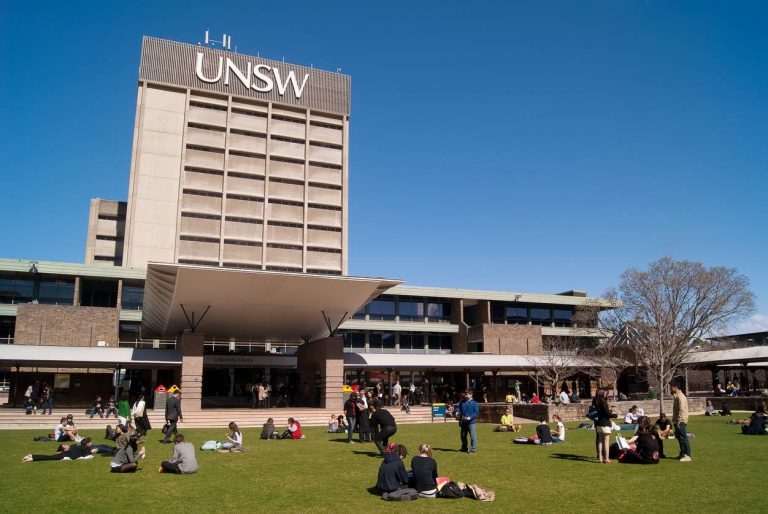
The University of New South Wales (UNSW) is a research-intensive university located in Sydney, Australia. It is well known for its innovative technique of teaching and research across a range of disciplines, including medicine, natural and physical sciences, humanities and law and more. UNSW is ranked 2nd in Australia and 27th in the world for Graduate Employability.
UNSW is a great choice if you are looking to pursue medicine in Australia. Its medical programme accreditation is recognised globally, and it comes with a strong focus on clinical experience and practical skills. The university also provides opportunities for students to engage in various research projects and contribute their ideas to new experiments and discoveries.
Programme Offered | Duration | Intake | Indicative Fees (2023) |
Bachelor of Medical Studies/Doctor of Medicine | 6 Years | February | International Students: AU$485,015 |
Bachelor of Medical Studies/Doctor of Medicine/Arts | 8 Years | February | International Students: AU$656,440 |
Contact us right now for a free consultation if you’d like more details about the costs, the format of the programme, and the entry requirements!
2. The University of Sydney
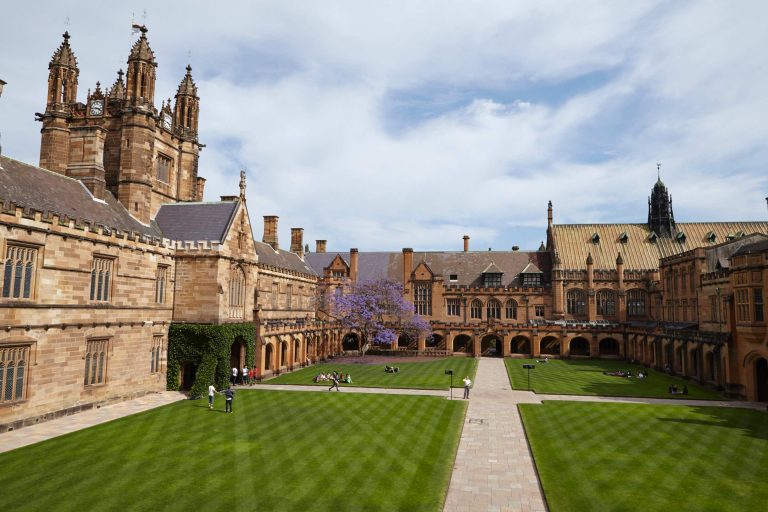
The University of Sydney is Australia’s oldest public research university, and it is consistently ranked as one of the top universities in the world. As for the option to become a Doctor in Australia, The Faculty of Medicine and Health at the University of Sydney is famous for its world-class medical education and research programmes, which make a great choice for you to further your study there.
Studying at the University of Sydney offers students a complete yet rigorous education, giving them the headstart they need to build their career, such as in the medical field. Additionally, the university has strong partnerships with major hospitals and medical centres, providing ample opportunities for clinical placements and real-world experience upon graduation.
Programme Offered | Duration | Intake | Indicative Fees (2023) |
Bachelor of Science and Doctor of Medicine | 7 Years | July | International Students: AU$374,500 |
Doctor of Medicine | 4 Years | July | International Students: AU$354,500 |
Contact us right now for a free consultation if you’d like more details about the costs, the format of the programme, and the entry requirements!
3. University of Queensland
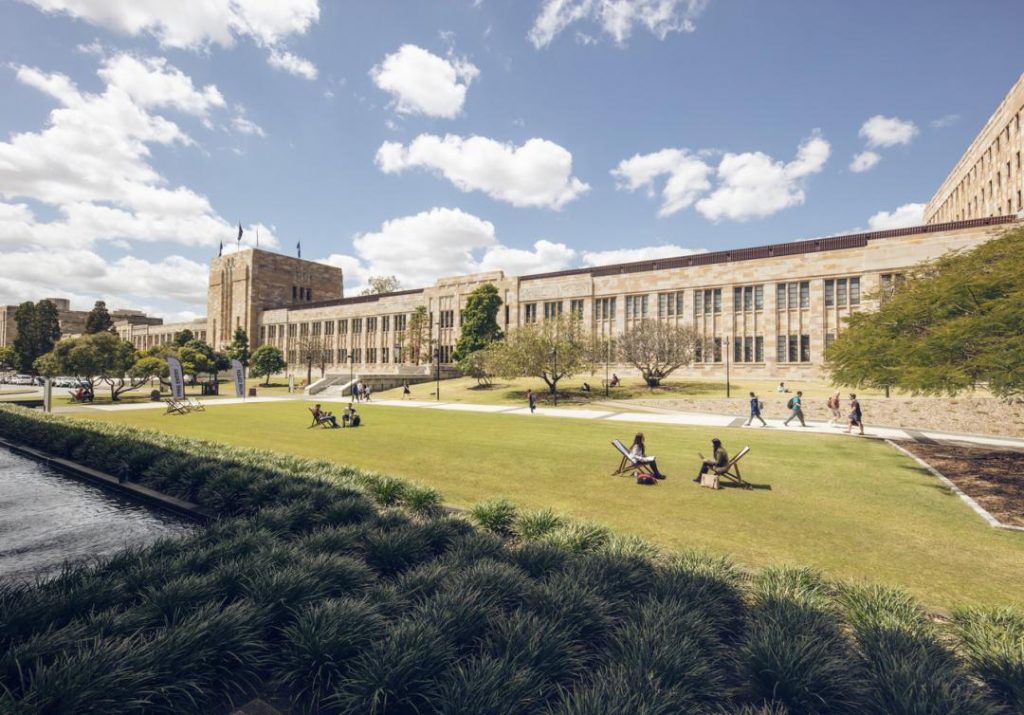
The University of Queensland (UQ) is a research-based institution located in Brisbane, Australia, with a constant ranking among the top universities in Australia and globally. UQ is one of the sandstone universities of the nation and has a strong reputation for producing employer sought after graduates in various fields, such as medicine, justice, communication, business and many more.
The Faculty of Medicine at UQ offers a wide range of undergraduate and postgraduate courses in medicine, health, and biomedical sciences. Students will get the benefit of access to cutting-edge facilities and experienced educators who provide hands-on training and research opportunities. By studying medicine at UQ, students can prepare themselves for a rewarding career in the medical industry with ease.
Programme Offered | Duration | Intake | Indicative Fees (2023) |
Bachelor of Biomedical Science/ Science | 4 Years | February | International Students: AU$182,272 |
Doctor of Medicine (MD) | 4 Years | February | International Students: AU$340,096 |
Contact us right now for a free consultation if you’d like more details about the costs, the format of the programme, and the entry requirements!
4. The University of Adelaide
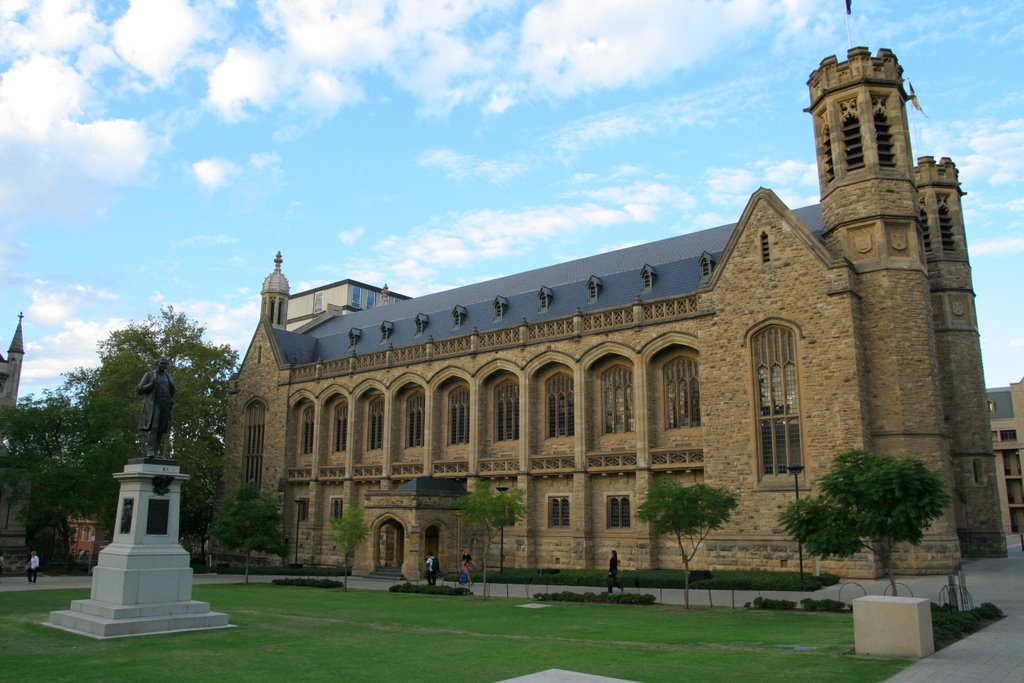
The University of Adelaide is a prestigious university located in South Australia and they pride themselves on their outstanding academic programmes, coupled with hands-on research opportunities. It has a long and standing history of producing top-tier medical graduates and researchers in many fields.
The University of Adelaide is an excellent choice for students who are interested in pursuing a career in medicine. The university offers a comprehensive medical programme that is specifically designed to give students the necessary knowledge, skills, and experience to become medical professionals. The programme is being put together by many industry professionals in order to share real-world experience with the students. This can equip them with the needed qualifications and skills to propel their career and anticipate the changing world pattern.
Programme Offered | Bachelor of Medicine and Bachelor of Surgery |
Duration | 6 Years |
Intake | February |
Indicative Fees (2023) | International Students: AU$501,000 |
Contact us right now for a free consultation if you’d like more details about the costs, the format of the programme, and the entry requirements!
5. Flinders University

Flinders University is a public research university located in Adelaide, South Australia. It is a globally recognised institution that offers an array of courses with different study options across various areas. The university is particularly known for its exceptional medical programme, which is crafted to produce skilled doctors who can make a positive impact on the world.
Studying medicine at Flinders University offers a one-of-a-kind experience, as the university provides students with extensive clinical training opportunities, state-of-the-art facilities, and a conducive learning environment. Graduates of Flinders University’s medical programme are highly respected in the medical field and are well-equipped to take on any new challenges.
Programme Offered | Bachelor of Clinical Sciences, Doctor of Medicine |
Duration | 6 Years |
Intake | February |
Indicative Fees (2023) | International Students: AU$264,600 |
Contact us right now for a free consultation if you’d like more details about the costs, the format of the programme, and the entry requirements!
For more information regarding the university, programs offered, entry requirements and fees, contact Excel Education.
Recommended Articles to Read
About The Author

Eric Chooi
A passionate and inquisitive writer, always looking for new ways to write. If you don’t see him writing, maybe he is hunting for some good food!

